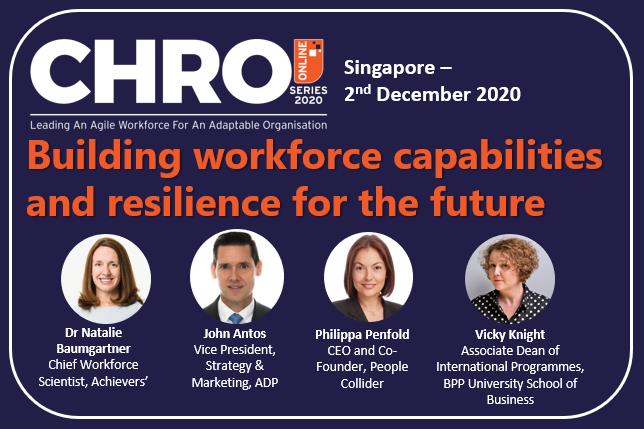Building workforce capabilities and resilience for the future

Workplace resilience will hold the key to overcoming obstacles and successfully navigating critical events. Unfortunately, workforce resilience is still lacking in today’s workplace, lamented Dr Natalie Baumgartner, Chief Workforce Scientist, Achievers.
Speaking at CHRO Singapore Online, Dr Baumgartner urged organisations to make it a priority to establish resilience for the long term, by first putting in place culture alignment, or having a small set of core values aligned with structure, strategy and people. Particularly for an organisation’s people, it is important to maintain constant communications, implement action to act on employee’s feedback, and constantly recognise the work of employees.
Next, ensure continuous conversation with employees. This means encouraging ongoing two-way conversation, and to ensure that information and feedback are shared regularly. Organisations need to ensure that they hear how their employees are doing to understand what is really going on in the organisation.
Lastly, promote active engagement that is fluid personal and take rapid micro-action. For example, just having surveys is not enough if organisations do not turn the findings into actions that employees want to see.
Capability building is much more important now than before the COVID-19 crisis began, argued Vicky Knight, Associate Dean of International Programmes, BPP University School of Business. Urging CHROs to act on the issue now, Knight also pointed out that HR leaders need to consider a more strategic approach when it comes to reskilling and upskilling workers.
According to Knight, for employees who stay in their current roles, 40% of their core skills will have changed by 2025, when as many as half of the global workforce will need reskilling.
Organisations thus, need to place a renewed focus on people and their capability, and engage in organisational capability analysis, or the process of using the latest research to identify future skills needs for roles in an organisation, and accessing the current capability of individuals in those roles.
Knight proposed a three-step process organisations can adopt for organisational capability analysis, beginning with research and insight. With skills gaps remaining the most significant challenge to delivering digital transformation, research and insight allows organisations to identify future skills against global trends.
Then, through skill matrices and heatmapping, they can create priority roadmaps and close capability gaps, while upskilling and reskilling roadmaps can help organisations build a futureproof workforce, Knight added.
Business and employee needs are being shaped by changes in external environmental factors, said John Antos, Vice President, Strategy & Marketing, ADP. In planning their transition into a new year, leaders need to recognise that health comes first before business, and the economic slowdown will invariably, outlast the pandemic.
Changes in business models create transformation challenges and opportunities for HR leaders, he added, as business is interrupted through organisations attempt to overcome the disruption to business and stay afloat in the pandemic.
How then, does the new horizon look like as organisations look ahead? Sharing key findings from studies conducted by the ADP Research Institute, Antos pointed out that online and technology is now taking centre stage, and deeper investments in technology will continue as conditions persist.
Upskilling needs to take place to manage changes, and compensation is being used to help drive employee behaviour to deliver in changed work models, he concluded.
READ: CHRO Online Malaysia: Redefining leadership in a transformed workplace
Rounding off a successful CHRO Online Singapore, Philippa Penfold, CEO and Co-Founder, People Collider, shared some of the key skills that could potentially make or break HR in 2021.
Based on a recent survey conducted by People Collider and Thrive HR Exchange, Penfold identified some of the key skills that are increasing in importance for HR. These include, but are not limited to, analytics, digital, technology, data management, leadership, communication, and coaching, among others.
In terms of development focus areas, both Technology/HR Tech and Analytics/Statistics have been identified as key future development areas over the next 12 months, at a higher rate than when they were seen as key development areas over the past 12 months.
As 2021 begin to appear on the horizon, do individuals have a personal and/or team development plan ready? Hearteningly, half of respondents to the survey indicated that they already have a plan based on what they need to learn to stay employed.
37% of respondents said they have a “good idea” what development they need, but do no have any idea how to get it yet, while 10% said they are not sure where they need to develop, even if they acknowledge that they need to do something.
CHRO Online Singapore was part of CHRO Online Series 2020, which was sponsored and supported by ADP, Microsoft, Achievers and BPP.



